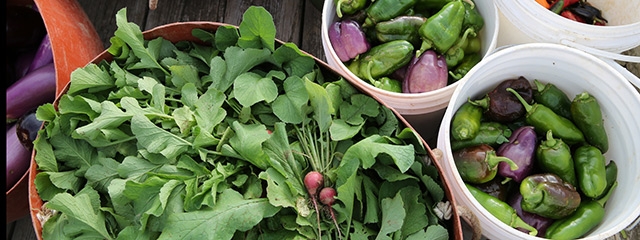Hampshire College President Jonathan Lash writes for the Huffington Post on how Hampshire educates for change in and outside of the classroom, including the food we eat on campus.
Students think about food. The type of thought may vary by age, personal circumstance, setting, or institutional mission, but food is an essential interest in every learner’s life. Something so universally important offers rich opportunities for interdisciplinary learning.
Food served on a campus conveys values: Do we value healthy, tasty, and sustainable? Food choices carry social and environmental justice implications for the future as well as for today. Cheap food costs here may be built upon harsh labor and environmentally degrading practices elsewhere. We need to ask what the changing climate will do to the global capacity to produce food, and how we will feed 9 billion people in a warming world.
Educating for change includes educating future generations of healthy, ethical food producers and consumers, the kind of independent thinkers and learners who can put ideas into action and help change the way we interact with food on a daily basis. Not all teaching takes place in a classroom. Campuses can enable students to explore issues of food health, sustainability, and justice by experimenting with new models of production and delivery that can help solve resource challenges, locally and globally.
I live in the Pioneer Valley on a campus built on farmland and orchards cradled by the Holyoke Range. Land and location shape our days. Some forward-looking professors in the 1970s established a Farm Center, integrating the study and practice of sustainable farming and food systems into a liberal arts program. A flexible interdisciplinary academic structure enables students and faculty to work in and across a wide variety of fields, using the Farm Center as a hub.
Again, questions and resources available within institutions will vary, but every learner is interested in food. Just as each school must be true to its own mission, each setting will present unique opportunities to take full advantage of food as an academic resource.
Some students will learn to manage and run food operations or farms. Some may come up with truly revolutionary ideas with the potential to change food systems for the future. All will become more-informed consumers.
The Hampshire community is working to demonstrate that if you’re thoughtful, you can enjoy high-quality food that’s sustainable, good for you and good for the world, and not have it be terribly expensive. We call it the Healthy Food Transition. In my next post here, I will share some specific choices and actions we’re taking, as a case study from one campus, with the goal of getting others to think and talk about what is being done or might be possible on other campuses.







Pingback: The Healthy Food Transition